T wave inversion - Study guides, Class notes & Summaries
Looking for the best study guides, study notes and summaries about T wave inversion? On this page you'll find 1008 study documents about T wave inversion.
Page 4 out of 1.008 results
Sort by
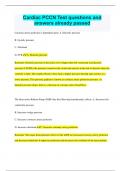
-
Cardiac PCCN Test questions and answers already passed
- Exam (elaborations) • 6 pages • 2024
- Available in package deal
-
- $9.99
- + learn more
Cardiac PCCN Test questions and answers already passed Coronary artery perfusion is dependent upon: A. Diastolic pressure B. Systolic pressure C. Afterload D. SVR A. Diastolic pressure Rationale: Diastolic pressure in the aortic root is higher than left ventricular end diastolic pressure (LVEDP) (the pressure exerted on the ventricular muscle at the end of diastole when the ventricle is full). This enables blood to flow from a higher pressure through open arteries to a lower pre...
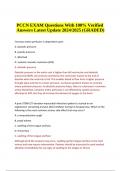
-
PCCN EXAM Questions With 100% Verified Answers Latest Update 2024/2025 (GRADED)
- Exam (elaborations) • 50 pages • 2024
-
- $17.49
- + learn more
PCCN EXAM Questions With 100% Verified Answers Latest Update 2024/2025 (GRADED) Coronary artery perfusion is dependent upon: A. diastolic pressure B. systolic pressure C. afterload D. systemic vascular resistance (SVR) A. diastolic pressure Diastolic pressure in the aortic root is higher than left ventricular end-diastolic pressure (LVEDP), the pressure exerted on the ventricular muscle at the end of diastole when the ventricle is full. This enables blood to flow from a higher pressure ...
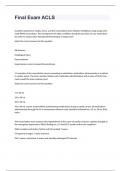
-
Final Exam ACLS 2024 with 100% correct answers
- Exam (elaborations) • 18 pages • 2024
-
- $16.49
- + learn more
A patient experiences cardiac arrest, and the resuscitation team initiates ventilations using a bag-valve-mask (BVM) resuscitator. The development of which condition during the provision of care would lead the team to suspect that improper BVM technique is being used? Select the correct answer to this question. Rib fracture Esophageal injury Pneumothorax Hypertension correct answersPneumothorax 1 A member of the resuscitation team is preparing to administer medications intravenously to...
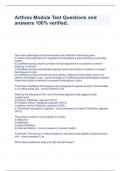
-
Arthrex Module Test Questions and answers 100% verified.
- Exam (elaborations) • 20 pages • 2023
- Available in package deal
-
- $13.39
- 1x sold
- + learn more
Arthrex Module Test Questions and answers 100% verified. One major advantage of dual wave pump over traditional inflow only pump: a) Inflow only pumps allow for regulation of fluid pressure automatically by controlling outflow b) DualWave pumps require constant manual adjustment to of outflow to maintain pressure in the joint c) DualWave pumps automatically regulate inflow and outflow to maintain a constant fluid pressure in joint d) DualWave pumps only feature active ou...
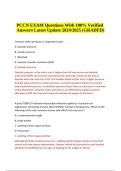
-
PCCN EXAM Questions With 100% Verified Answers Latest Update 2024/2025 (GRADED)
- Exam (elaborations) • 50 pages • 2024
-
- $17.99
- + learn more
PCCN EXAM Questions With 100% Verified Answers Latest Update 2024/2025 (GRADED) A post-STEMI (ST elevation myocardial infarction) patient is started on an angiotensin-converting enzyme (ACE) inhibitor during his hospital stay. Which of the following is the most common serious side effect that may occur? A. a nonproductive cough B. pedal edema C. swelling of the tongue and face D. rhinorrhea C. swelling of the tongue and face Although all of the answers may occur, swelling og the tongue a...
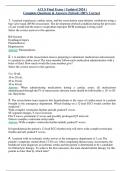
-
ACLS Final Exam ( Updated 2024 ) Complete Questions & Answers (Solved) 100% Correct
- Exam (elaborations) • 14 pages • 2024
-
Available in package deal
-
- $11.99
- + learn more
ACLS Final Exam ( Updated 2024 ) Complete Questions & Answers (Solved) 100% Correct 1. A patient experiences cardiac arrest, and the resuscitation team initiates ventilations using a bag-valve-mask (BVM) resuscitator. The development ofwhich condition during the provision of care would lead the team to suspectthat improper BVM technique is being used? Select the correct answer to this question. Rib fracture Esophageal injury Pneumothorax Hypertension Answer: Pneumothorax 2. 1 A mem...
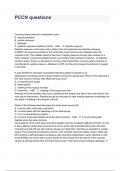
-
PCCN Exam Questions And Answers
- Exam (elaborations) • 56 pages • 2024
-
- $14.99
- + learn more
PCCN Exam Questions And Answers Coronary artery perfusion is dependent upon: A. diastolic pressure B. systolic pressure C. afterload D. systemic vascular resistance (SVR) - ANS A. diastolic pressure Diastolic pressure in the aortic root is higher than left ventricular end-diastolic pressure (LVEDP), the pressure exerted on the ventricular muscle at the end of diastole when the ventricle is full. This enables blood to flow from a higher pressure through open arteries to a lower pressur...
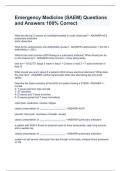
-
Emergency Medicine (SAEM) Questions and Answers 100% Correct
- Exam (elaborations) • 6 pages • 2024
-
Available in package deal
-
- $10.49
- + learn more
Emergency Medicine (SAEM) Questions and Answers 100% CorrectEmergency Medicine (SAEM) Questions and Answers 100% CorrectEmergency Medicine (SAEM) Questions and Answers 100% Correct What are the top 3 causes of morbidity/mortality in acute chest pain? - ANSWER-ACS pulmonary embolism aortic dissection What is the cardioversion and defibrillation joules? - ANSWER-cardioversion = 50-100 J defibrillation = 200 J What is the most common EKG finding in a pulmonary embolus? What should you be ...
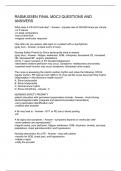
-
Rasmussen Final MDC3 Q&A 2023
- Exam (elaborations) • 18 pages • 2023
-
- $14.49
- + learn more
What does A Fib ECG look like? - Answer- -impulse rate of 350-600 times per minute -no P waves -no atrial contractions -loss of atrial kick -irregular ventricular response How often do you assess vital signs on a patient with a dysrhythmia (gray box) - Answer- at least every 4 hours Nursing Safety Priority for Sinus tachycardia what to assess (gray box) - Answer- -fatigue, weakness, SOB, orthopnea, decreased O2, increased HR, decreased BP, angina, palpitations -ECG: T wave inversio...
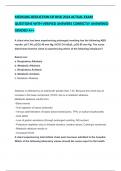
-
MEDSURG REDUCTION OF RISK 2024 ACTUAL EXAM QUESTIONS WITH VERIFIED ANSWERS CORRECTLY ANSWERED GRADED A++
- Exam (elaborations) • 17 pages • 2024
-
Available in package deal
-
- $9.49
- + learn more
MEDSURG REDUCTION OF RISK 2024 ACTUAL EXAM QUESTIONS WITH VERIFIED ANSWERS CORRECTLY ANSWERED GRADED A++ A client who has been experiencing prolonged vomiting has the following ABG results: pH 7.48; pCO2 40 mm Hg; HCO3 34 mEq/L; pO2 85 mm Hg. The nurse determines that the client is experiencing which of the following imbalance? Select one: a. Respiratory Alkalosis b. Metabolic Alkalosis c. Respiratory Acidosis d. Metabolic Acidosis b. Metabolic Alkalosis Alkalosis is reflected by...

Do you wonder why so many students wear nice clothes, have money to spare and enjoy tons of free time? Well, they sell on Stuvia! Imagine your study notes being downloaded a dozen times for $15 each. Every. Single. Day. Discover all about earning on Stuvia


